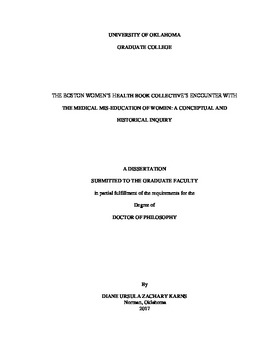| dc.description.abstract | This study of the educational thought of the Boston Women’s Health Book Collective (BWHBC) uses Jane Roland Martin’s concept of cultural miseducation (2002) to theorize the “medical mis-education of women,” which is revealed as an oppressive force in the lives of women (Chomsky 2002, Woodson 1933, Dewey 1938). Also evident in secondary schooling (AAUW 1992), women's medical mis-education begins in the history of women’s health (Ehrenreich and English 1989, 2010, 2011; Achterberg 1990; Brumberg 1997; Greenspan 1983; Sherwin 1992) that is perpetuated through contemporary sex education in schools. Evidence shows that the abstinence-only sex education curriculum in the United States creates a hostile learning environment that has left students unprepared to care for their own health and bodies (Klein 2005, Garcia 2012, Valenti 2009, Luker 2006, Carlson 2012). The guiding question of this inquiry is: What can schools learn from the BWHBC to remedy the medical mis-education of women?
Constructing an interdisciplinary educational inquiry protocol for what I call the "Oral-Theorizing Interview" (OTI), derived from philosophical, historical, and social scientific methods (Given 2008, Yow 2005, Van Manen 1990, Marshall and Rossman 1995, Martinich 2005) while utilizing a feminist lens (Lather 1991, Crenshaw 1991, Collins 2000, Martin 1985), I identify and name problems that defined women's medical mis-education for BWHBC founders: Deference, Isolation, Inferiority, Knowledge, Experience, and Control. My analysis of their thinking about their work on these problems formulates the "Isolation-Knowledge Remedy," the "Inferiority-Experience Remedy," and the "Deference-Control Remedy." Suggesting these remedies' possible applicability to schooling, this study recommends utilizing the OTI to examine the new thinking of more racially and sexually diverse contemporary women’s health movements' leaders to construct educational wisdom needed if sexuality and health education in diverse public schools is to honor the intentions of Title IX for all. | en_US |
